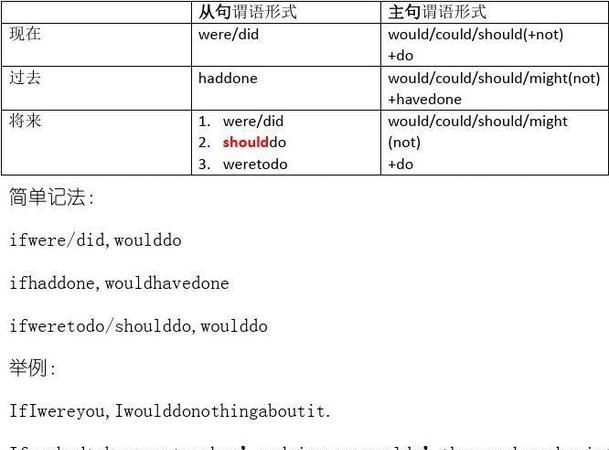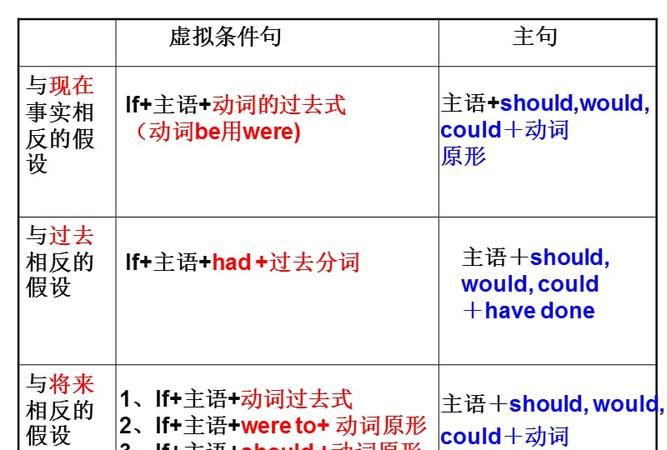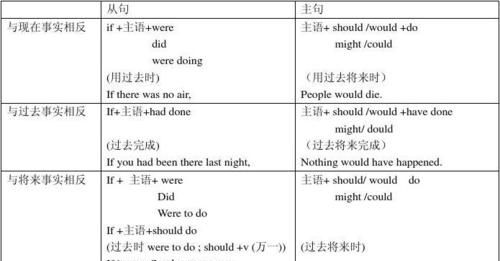本文目录
从句中用虚拟语气的动词
01.表示与现在事实相反的假设
从句: if+主语+were或动词过去时
主句:主语+ should/would/could/might+动词原形
02.与过去事实相反的假设
从句: if+主语+had+过去分词
主句: 主语+ should/would/could/might+have+过去分词
03.表示与将来事实相反的假设
从句 if+主语+should/ were to/动词过去时
主句 主语+ should/would/could/might+动词原形

用虚拟语气的词语有哪些
一、insist
1、含义:vt. 坚持;坚决主张,vi. 坚持;强调。
2、用法
insist的基本意思是“坚持”,常用于坚持意见、看法、主张等。insist既可用作及物动词,也可用作不及物动词。作及物动词时,不能用名词、代词或动词不定式作宾语,只能接that引导的从句。
若指尚未发生的动作,从句谓语常用虚拟语气(should+动词原形或直接用动词原形);若表示一个已发生的动作或已存在的状态时,从句谓语多用陈述语气。that有时可以省略。
insist用作不及物动词时,其后常须加介词on〔upon〕,然后接名词、代词或动名词。该动名词前可加物主代词或名词、人称代词的宾格形式作其逻辑主语,该动名词的否定形式是在其前直接加not。
He insisted that he had done right.
他坚决认为自己做对了。
They insist that I stay there for supper.
他们坚决要求让我留下吃晚饭。
二、command
1、含义:n. 命令;指挥;掌握;[计算机] DOS命令 : 引用辅助命令处理器,v. 命令;指挥;掌握;博得。
2、用法
command用作动词是正式用语,表示“命令,要求”时,一般不用作进行时; 其后可接名词或代词作宾语,接带动词不定式的复合结构和that从句时,从句中的谓语动词应用虚拟式,即“(should+)动词原形”。command在书面语体中可以引出直接引语,作“命令道”或“用命令的口气说道”解。
He growled a command to her to stop.
他咆哮着命令她停下来。
The company commander roared his command.
连长高声发布命令。
三、suggest
1、含义:vt. 建议;暗示;使想起;表明;要求。
2、用法
suggest的基本意思是“建议”“提议”,还可表示“暗示,表明”“使想起”等。suggest作“建议”“提议”解后接that从句作宾语时,从句中的谓语动词要用虚拟式; 作“表明,暗示”“使想起”等解时,从句中的谓语动词可用陈述式。
I suggested going for a walk.
我建议去散步。
I suggested to him that we should tackle the problem another way.
我向他建议我们用另一种方式处理这个问题。

四、propose
1、含义:v. 打算;计划;向 ... 提议;求婚;提名。
2、用法
propose的基本意思是“提议,建议”,多指在讨论或争辩中提出明确的意见或建议,强调要求对方予以考虑或同意。引申可表示“打算,计划(做某事)”。可用作及物动词,也可用作不及物动词。用作及物动词时,可接名词、代词、动名词、动词不定式或从句作宾语。后接从句时,从句要用虚拟语气。
I propose an early start tomorrow morning.
我打算明天早上早点出发。
He proposed to buy and run a farm.
他计划购买并经营一个农场。
五、require
1、含义:v. 要求;需要;命令;规定。
2、用法
require接含有被动意义的非谓语动词时,不定式表示被动结构,而动名词表示主动结构; require接that从句时从句中的谓语动词要用虚拟式。
The director required that we should work all night.
主任要求我们通宵工作。
We must not propagate one method and require all localities to adopt it.
我们在宣传上不要只讲一种办法,要求各地都照着去做。
哪些动词后面的宾语从句经常使用虚拟语气
动词 wish, suggest, order, insist, propose等后面的宾语从句中常使用虚拟语气,此时宾语从句中的动词表示的是一种愿望和要求。 表示“要求、建议、命令”等动词后面的宾语从句中的虚拟语气。这类动词包括:demand, suggest, order, insist, propose等。这些动词后面的从句中用“should + 动词原形”构成虚拟语气, 其中“should”可以省略。

哪些词后面接虚拟语气
1.动词suggest,order,demand,propose,request,command,insist等后的宾语从句中,用虚拟语气(即Should+动词原形或只用动词原形)来表示愿望、建议、命令、请求等。在动词wish /would rather后的宾语从句中,用过去式表示与现在事实不符,用过去完成式表示与过去事实不符。
e.g. I suggest that we(should)set off at once.
The doctor insisted that the patient (should)be X-rayed.
I wish I were as strong as you.
I would rather that you hadn't told him.
2. 在 suggestion, proposal,idea,plan,order,advice等名词后的表语从句、同位语从句中要用虚拟语气,即should+动词原形或只用动词原形。如:
Our suggestion is that you( should)be the first to go.
My advice is that we(should)send for Doctor Li.
Do you know the order that you(should)keep watch?
3. 在It is necessary/important/strange/natural;It is requested/suggested/desired/proposed;it is a pity等结构后的主语从句中要用虚拟语气,即Should+动词原形或只用动词原形。如:
It is necessary that he(should)be sent there at once.
It is requested that Professor Li(should)give us a speech.
It is desired that we(should)get everything ready by tonight.
4. 在as if引导的状语从句中,用过去式表示与现在事实不符,用过去完成式表示与过去事实不符;They talked as if they had been friends for years.
5. 在so that,in order that引导的状语从句中,(根if状语从句中的主句形式相同)常用should/would/could/might+动词原形来表示虚拟语气。如:
She stayed at home for a few days so that she could take care of her mother.
He took a taxi to the station so that she should not miss the train.
6.在it is time后面的定语从句中常用过去式表示虚拟。
It’s time I was going.
It’s time somebody taught you to behave yourself.
7. 由wish引起的表示愿望的虚拟语气
A.用wish表示对现在的愿望时,它所引起的宾语从句中谓语动词形式为:过去式(be动词用were)。
B.用wish表示对将来的愿望时,它所引起的宾语从句中谓语动词形式为:would, could, might+ 动词原形。
C.wish用于对过去的事实表示一种不可能实现的愿望时,宾语从句中的谓语动词形式为:had+动词过去分词或could, would + have +动词过去分词。
I wish that he weren’t so lazy.
I wish I hadn't wasted so much time.
I wish she would change her mind.
8. had hoped/ planned/ thought/ wanted/ intended表示一种过去未实现的愿望或令人失望的事。
I had thought he had been dead for at least 20 years.
I had hoped that she would go to the U.S. and study there, but she said
she liked to stay in China.
9. would rather.( 与if 从句相同)
would (had) rather, would as soon, would sooner和would prefer所引起的从句中要求用过去式表示当时或将来的情况,用过去完成时表示过去的情况,表示希望或婉转的责备。例如:
I’d rather you posted the letter right away. 我倒希望你把这封信立刻寄出去。
I would prefer he didn’t stay there too long.我倒希望他不要在那儿可得太久。
I would just as soon you had returned the book yesterday.我真希望你昨天把这本书还了。
10. 虚拟语气在由某些连词,常见的这些连词和介词有:与if 从句相同
1) unless (除非),provided(倘若),supposing(假若),providing(倘若) , on condition that(如果),由这些词、词组引出的从句,动词多用过去时。
除非你命令他做,要不他是不会做的。
He wouldn't do it unless you ordered him to.
假若你有机会出国,你会去哪儿呢?
Providing(if) you had the opportunity to go abroad, where would you go?
11. for fear that(以免, 唯恐),in order that (以便),whether(不管),lest(以免),in case (假使),从句中加情态动词,有时should可省略。
他把它藏起来以免她看见。
He hid it lest she (should) see it.
我得准备点啤酒,说不定约翰会来。
I'll get some beer in case John should come.
他轻轻地进屋,以免吵醒他的同房。
He entered the room quietly in order that he should not wake his roommate.
12. if only, 与if 从句相同
如果表示对现在的愿望,句中的谓语动词常用过去式;
如果表示将来的愿望,句中的谓语动词常用would/could+动词原形;
如果表示对过去的愿望,句中的谓语动词常用had+过去分词。
if only I were you!
If only you had come yesterday!
If only Linda could go with us tomorrow!
If only I had said more about it!
还有最常见的就是if 条件句了,你应该挺清楚了吧。就不写了。

以上就是关于从句接虚拟语气的十三个动词 ,从句中用虚拟语气的动词的全部内容,以及从句接虚拟语气的十三个动词 的相关内容,希望能够帮到您。
